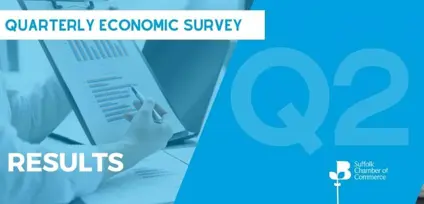Q2 Economic Survey Results Published - Hopes of Sustained Recovery Fade

“In recent years, Suffolk’s economic performance has been a lead indicator in predicting later nationwide trends. That is why it is essential that policymakers in Westminster and Whitehall sit up and take note about these significant falls in the county’s export activities. This doesn’t augur well for an economic recovery anytime soon.”
Paul Simon, Suffolk Chamber’s head of public affairs, was reflecting on the results from Suffolk Chamber of Commerce’s Quarterly Economic Survey (QES) for the period from April to June.
These have reversed most of the gains briefly recorded in the previous three months – with the outlook for manufacturers in the short-term looking especially concerning.
Most of the measures recorded by the QES fell in Suffolk, far more than for the eastern region as whole. This may reflect the county’s trading exposure to international markets, thanks to its strengths in ports and logistics and the impact of the recent strengthening of the pound.
Manufacturers reported a 48 percentage point fall in export sales (to a negative balance of -43%) and a 40 percentage point drop in export orders (-50%). Service companies experienced smaller, but still significant, declines against both measures with export sales (-21%) and exports (-26%) down 17 and 26 percentage points respectively. The Suffolk service sector’s export sales balances has now been in negative territory for 15 of the last 20 quarters, with the order measure recording only four positives across the previous 23 months.
Domestic sales and orders for both types of companies remain anaemic with zero or very small positive balances.
Manufacturers reported declines in most other key measures, including cash flow (down by two percentage points), investment in plant and machinery (down 19 percentage points), confidence in improving turnover (down 25 percentage points and confidence in improving profitability (down 11 percentage points).
“It does now appear that the small recoveries recorded at the start of the year were a blip. This latest data confirms the longer-term trend of declining activity and sentiment experienced since the brief post COVID19 pandemic recovery” added Paul Simon
There was one piece of comparative good news in that worries about rising prices have fallen and are now at their lowest for over a year. However, at 75% inflation remains the biggest issue facing Suffolk businesses, followed by interest rates (53%) and taxation (33%).
Comments from Suffolk Chamber members include:
-
“The economy has flatlined. There is only negative movement”
-
“Profit margins looking much lower for this financial year. It is a worrying trend”
-
“We seem to be walking into a recession despite what the media say – trade is very sluggish and patchy”
However, in the longer-term, Suffolk Chamber remains optimistic about the outlook for the business community.
Toby Warren, senior policy officer, explained that: “Suffolk remains in a better position than most to withstand future shocks and take swift advantage of new opportunities. Suffolk Chamber, through its suite of services and lobbying activities, remains well-positioned to make the best contribution possible to help deliver sustainable and enduring prosperity for us all.”
View the latest analysis with Paul Simon, Head of Public Affairs and Toby Warren, Senior Policy Adviser at Suffolk Chamber of Commerce, as they reflect on the results from the Q2 Quarterly Economic Survey (QES) conducted between April and June.

